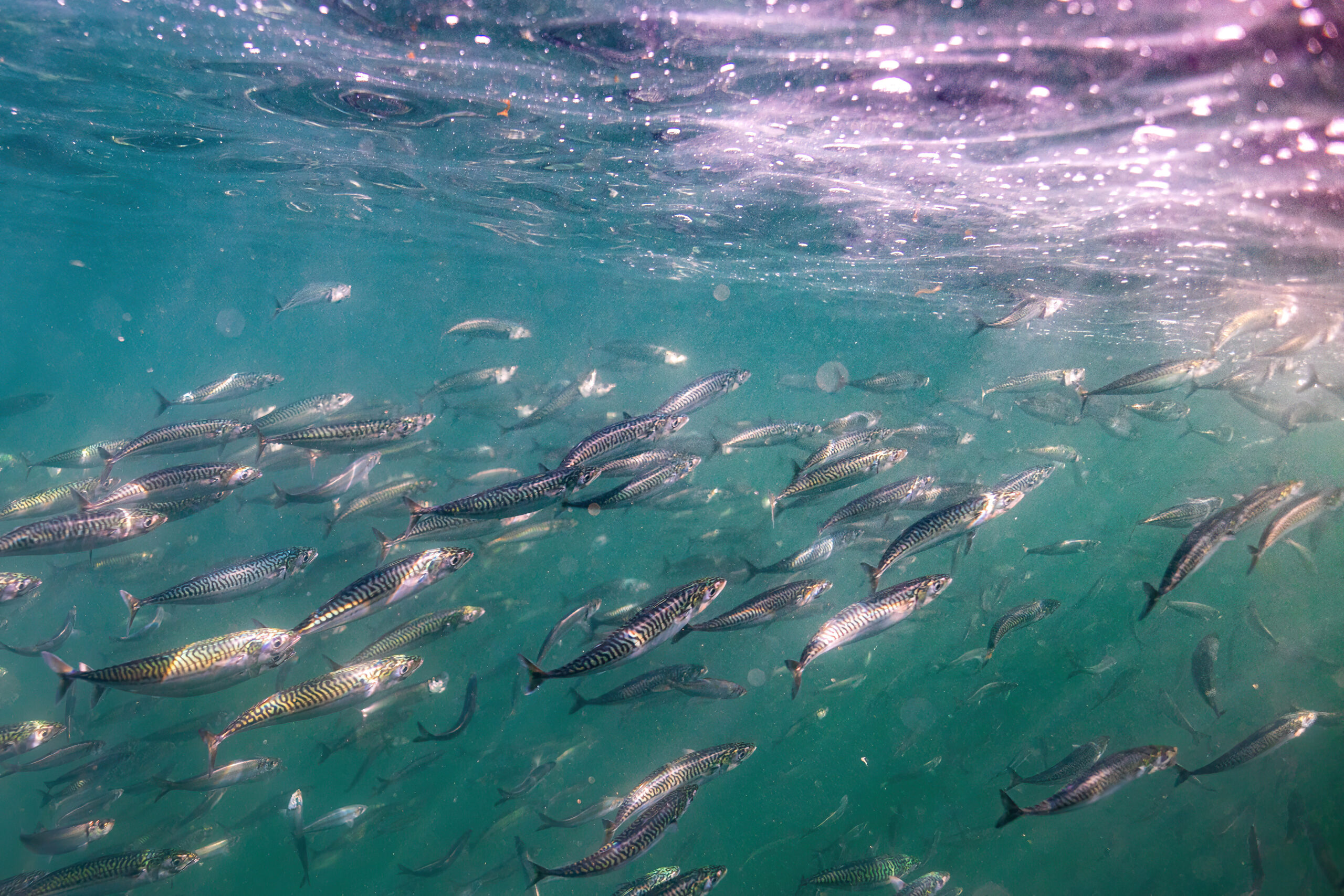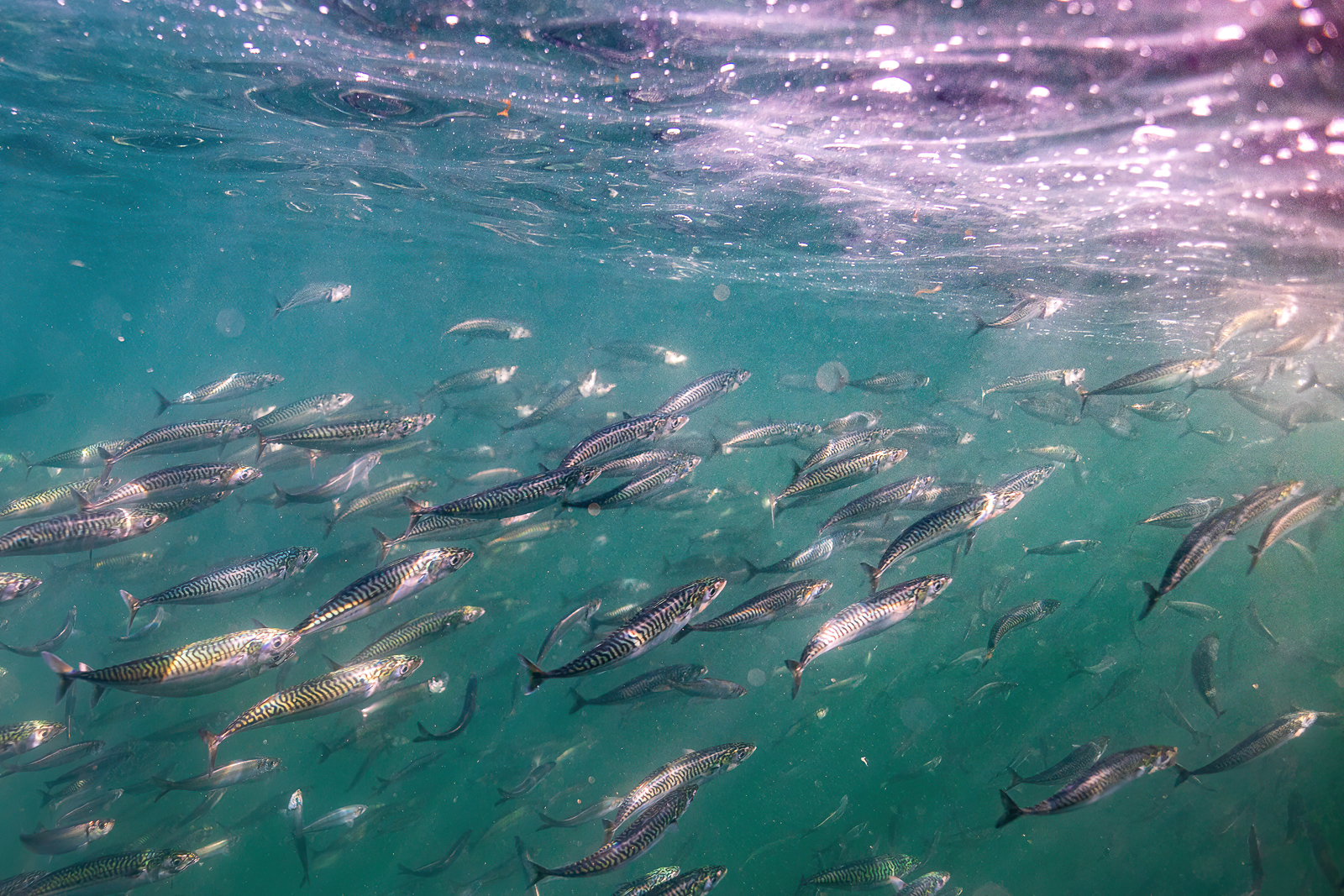
SIZE:
30 to 40 cm, can reach up to 60 cm; weighs of 500 g to 1.5 kg, and even up to 3.4 kg.
LIFE EXPECTANCY:
Up to 17 years.
LIFE CYCLE:
Sexual maturity is attained at about 2 or 3 years of age.
In the Gulf of St. Lawrence, Atlantic mackerel spawn in June and in July in the southern part of the gulf. Females can lay up to 1 million eggs per spawning season. They can lay their eggs several times, both during the day and at night. Incubation lasts a week.
Temperature changes in the waters of the St. Lawrence are affecting their ability to reproduce.
The Atlantic mackerel’s back is an iridescent, metallic blue-green. It is striped with black bands and has dark patterns on its flank. Its scales are tiny, making this fish quite soft to the touch. It has a slender, tapered body and a pointed head. The Atlantic mackerel does NOT have a swim bladder, which allows it to change depths rapidly. However, it must continuously move forward to ensure an oxygen supply.
In the water column, down to 1000 m depth but more frequently found down to 200 m, in cold to temperate waters. A migratory and gregarious fish.
Atlantic mackerel live at the bottom of the water column in winter and rise to the upper layers in spring. They arrive in the southern Gulf of St. Lawrence toward the end of May. After spawning, they disperse into the estuary and return to the gulf between September and November.

Mackerel live in schools.
Credit: Jean-Christophe Lemay, photo taken in Twillingate, in 2022.
PREYS:
Plankton
Fish eggs
Young or small fish
Atlantic mackerel play a key role in the ecosystem, contributing to the transfer of nutrients between the lower trophic levels (plankton) and the upper trophic levels (predators).
PREDATORS:
Atlantic cod
Atlantic bluefin tuna
Seals
Sharks
MACHINES:
Gillnet, seine, line.
REGULATIONS:
Commercial and baitfish fishing were urgently closed by Fisheries and Oceans Canada in 2022 because the species’ stock status became “critical.”
Other regulations:
- Total authorized catch (before the ban)
- Suspension of new permits since 2017
- Specified fishing season
- Fishing for bait authorized by permit. Exclusive use by the fisherman; cannot be sold
- Commercial community fishing permits for certain native communities
- Recreational fishing daily limit of 20 mackerel per person since 2021 and a minimum catch size of 26.8 cm
Commercial fishing for Atlantic mackerel has existed since the 1600s.
Atlantic mackerel is an important baitfish, particularly for snow crab and lobster fishing. Given its decline, it is all the more essential to find sustainable alternative bait that would be effective and equally profitable, so as to limit the pressure on this species. Several facilities, such as Merinov and the Marine Biotechnology Research Centre (CRBM), are actively searching for solutions.
Getting local information
Certain populations of mackerel are on the World Wildlife Fund (WWF) list of fish “to protect.” Until 2019, this species also had a Marine Stewardship Council (MSC) approval. Evaluations and advice vary from region to region, as fish stocks are not the same everywhere. So, one must carefully read the information one receives.
BENEFITS:
Oily fish, rich in omega-3 fatty acids that help reduce the risk of cardiovascular disease and promote healthy immune, circulatory and hormonal functions.
LET’S COOK:
Quite a sharp taste; brown flesh.
OUR CULINARY ADVICE:
- Because it is an oily fish, there is no need to add fat when cooking it.
- Light cooking, such as steaming or en papillote, is best to avoid destroying the omega-3 fatty acids.
- If frozen, it will lose its flavour and nutrients. Freezing is also not the best way to preserve this fish because of its high oil content. Fresh, smoked and canned are preferable.
A word of warning
Given its vulnerable status, we do not recommend eating mackerel. Why not try capelin instead?





